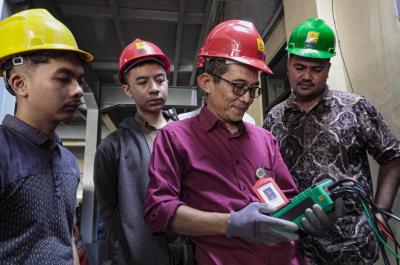
New Zealand-Maluku Access to Renewable Energy Support (NZMATES) provided Training on Stages and Methods for Carrying out Feasibility Studies for the Village Electricity (Listrik Desa, LISDES) Program for PLN Maluku and North Maluku (MMU) staff. This training was held in the MMU Region PLN Building Hall, Ambon City, Maluku, Wednesday-Thursday, January 18-19, 2023. There were eight implementing units present at the training, including PLN UP3 Ambon, Ternate, Tual, Saumlaki, Masohi, Sofifi, Tobelo, PLN UPK Maluku, and North Maluku, UPKK Maluku and UPKK North Maluku. The PLN staff who attended spent two days together studying how to plan the construction of a PLTS, starting from the survey stage, through to technical design and how to process survey data.
PLN MMU Electricity Planning Manager Khairul Sani conveyed in his remarks the importance of conducting field surveys, considering the target of the electrification ratio itself was also getting closer. The realization of RE PLN as of December 31, 2022, in Maluku Province was 96.24 percent, and in North Maluku Province was 96.64 percent. RE PLN Total UIW MMU of 95.54 percent. The realization of PLN's RDB as of December 31, 2022, in Maluku Province was 78.08 percent, and in North Maluku Province was 87.08 percent. RDB PLN Total UIW MMU of 82.51 percent. Of the 97 Lisdes UIW MMU PLTDs as of December 31, 2022, 38 PLTDs in 201 Villages have been lit, and 59 PLTDs (288 Villages) are still in progress and are planned to light up in the third quarter and fourth quarter of 2023.
For two days, PLN MMU staff appointed to prepare the LISDES feasibility studies (FS) in 27 locations-studied using not only a technical approach but also a reliable non-technical approach, not only relying on economic studies resulting from the PV- designed tool HOMER Pro. This is an NZMATES initiative to support the capacity building of PLN MMU and UP3 staff in Maluku. In addition, this is also part of the Hybrid Solar Project Feasibility Study work being carried out by PLN MMU.
On the first day, participants were given material related to health, safety, and security (HSS). This material is important, considering the varied characteristics that can be encountered when traveling across the Maluku region. When in the field, all personnel involved must have a good understanding of hazards and risk assessment and management, so that they can fulfil their responsibility and authority to stop any activity that they believe is unsafe, to avoid the occurrence of incidents or injuries. This material also covered safety devices, personal protective equipment and emergency evacuation procedures.
After the HSS material, participants then learned about community involvement in supporting the Lisdes FS, and non-technical aspects that must also be considered. On this first day, participants were introduced to what survey elements are commonly used by NZMATES in social, economic, and cultural surveys for the preparation of FS, as well as methods of collecting and processing data. In addition to survey instruments, training participants were also given knowledge about approaches to the community through aspects of local culture.
Finally the NZMATES team introduced the tools and methods used for technical data collection. This included the use of assessment and measuring equipment, technical survey forms, site survey techniques, as well as how to process and analyse the data to feed into the FS development.
On the second day, training participants were asked to practice what they had learned on the first day. Participants were divided into groups in order to simulate sharing roles between technical and non-technical teams. This gave the participants a chance to practice the different roles they may be required to take on later when conducting field surveys.
NZMATES saw that during the two days of training, the participants were enthusiastic about paying attention to the material and trying out technical aspects when there was an opportunity to practice. This can also be seen from the training feedback, where more than 90% of participants found the training relevant and helpful for their work, and results of the post-test scores, which increased for most participants after the training was carried out.
